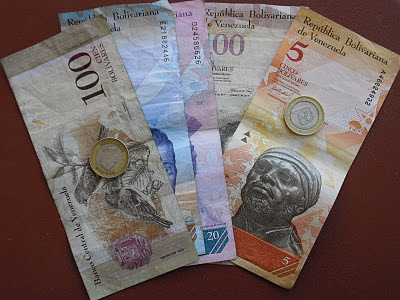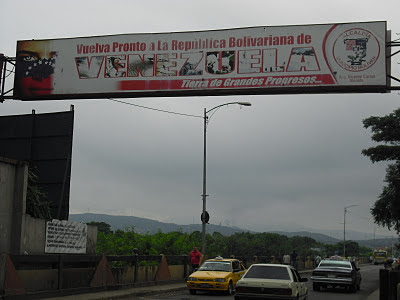The main problem with first impressions, as
they say, is that you only get to make one. Alas, for Venezuela – not that the
many seemingly myopic locals will care – what we witnessed on our admittedly brief
and limited sojourn into the country will not have us rushing back.
In theory,
there shouldn’t be a major difference between the Colombian and Venezuelan cultures.
Heck, the two countries were once together – along with other territories - in a
greater Gran Colombia. On the ground, though, they seem worlds apart.
The
warmth and friendliness that you’ll instantly get on arrival in Colombia is
replaced by a coldness bordering on hostility from a significant proportion of
the population in Hugo Chavez’s Bolivarian Republic. Of course, El Presidente is perhaps one of the main reasons for this - we won't go there just now, though.
Making the overland crossing into the
country, it doesn’t take long to notice the more negative vibe to the place.
From the border crossing a short drive outside the Colombian town of Maicao to
Venezuela’s second city of Maracaibo – no more than a two-hour drive – you’re
likely to be asked for your passport and visa stamp at least ten times.
Fantastic use of resources that.
What difference in your circumstances are they
expecting to find 10 kilometres down the road from the last check?
Possibly it
is a siege mentality thing derived from the top – ‘the foreigners are coming to
infiltrate us, make them feel ill at ease’ sort of thinking. If as a nation
it’s that paranoid, why not just follow the North Korean lead and don’t let
them in? It might just make life easier for everybody concerned.
 |
| Bolivar Fuerte - what's it worth? |
Then you have the currency – the "old" Bolivares or "new" Venezuelan Bolivar Fuerte (VEF). The two are still used in
pricing, but it’s the ‘Fuerte’ you’ll be physically using – it’s basically the
old money put into more basic units from what we can gather.
Go to an ATM
machine and you’ll get at best five VEF for your one euro. Go to one of the
numerous cambios – currency exchange operators – on the street and one euro
will get you, at least, a very nice 9.5 VEF. Almost double the value than what
you’ll get via official means at an ATM/bank.
So depending on how you’re
getting your money in Venezuela, the country can either be pretty economical or
quite damn expensive compared to its neighbours.
Knowing what we know now, the
best thing is to bring in with you large volumes of a foreign currency to
exchange on the street during your time there. Of course, such a strategy comes
with its own security problems, but it’s probably worth the risk.
Mentioning money, Venezuelan business
people we encountered seemed overly obsessed with it – and that’s saying
something considering the continent we’re in. Everything must be paid up front
– even at an internet cafe.
The advice here is to only give the bare minimum
required for whatever you’re getting or using. That’s because – for the most
part – once you hand over your cash, you won’t be getting it back if the
circumstances of what you originally paid for change. That’s a quick lesson to
learn, especially if Venezuela happens to be your first Latin American
experience or indeed if you’re visiting the country from Colombia, where they
tend to have a far more relaxed, reasonable approach in this regard.
 |
| Adiós Venezuela. 'Come back soon' - we'll think about it. |
Then you have the dirt. Now, as
the last few weeks have highlighted, this is something that doesn’t tend to
overly bother us.
However, a rubbish tip of a place – as is much of what we saw
of the country – coupled with a sour ambiance does not make for a good mix.
Throw in the most aggressive drivers we’ve come across on the continent –
another big statement for Latin America, but here they will knock you down if
you get in their way, no question – and you begin to wonder why you bothered
coming.
Like everything, though, you will find
exceptions to the prevailing disposition of the populace, but they seem very
hard to find.
Also, it must be said again that our stay in Venezuela was
short-lived – there is much more to the place than what we witnessed. It just
became too costly to keep going to the ATM.
So maybe with more time it might be
possible to discover a lighter side to the country. Some would argue
this does, in fact, exist – it’s called Colombia.
I think for a foreigner it's difficult to understand the nature of some situations in Latin America, and I would say that in fact there are different worlds in Latin America, one world is the follower of the US culture or the Western Capitalist culture.. like Chile, on its maximum expression of what's it to be a copy of a copy of the the most abusive systems in the world, the wild capitalism. Maybe, what you are experiencing is the environment of what's like to be in the front-line against the Empire. I recommend you to watch a documentary called "The War on Democracy" (and you're going to have a better understanding of the problems in latinamerica, with an interview of the President Chavez. And hey! at least he's democratic... Pinochet here and most of the presidents in Latin america now are nothing more that -cock suckers- of the US.) and you will understand better the nature of the problems and the character of the people in different situations like in Chile, Argentina, Colombia and all the countries under the hand of the power of the Evil Empire of the US, and countries that are in the front-line, trying to build a better future with real equality, and that's what happening in Venezuela.
ReplyDeleteAnyhow, very well written article just like always. Congrats and greetings from Santiago, Chile! Felipe.
Good points (as always!) Felipe... In one sense I wasn't really addressing the political situation - that's for a different day and different article. It was what I experienced on the ground I talk about here - which was, as I said, unfriendliness. I am not American - a gringo if you will - and indeed I would be against many of the USA's policies, which amount to what you might call neo-colonionism. However, in Venezuela, from what I witnessed - with some exceptions, thankfully - a foreigner is a foreigner no matter what (well perhaps it's a bit different for Latinos from other countries).
ReplyDeleteIn the coming weeks I intend to upload a speech written by the USSR's Foreign Minister Vyacheslav Molotov in 1945, just as the Cold War was about to kick-off. He talks about what would happen if US influence was allowed to dominate in Europe unchecked - they turned out to be quite prophetic words. Now of course some of the countries that remained under USSR influence may say now that they would have better dominated by the USA? There are arguments both ways...
Cheers for the comment though and keep them coming. Muchas gracias mi amigo...
well, thank you very much Brendan for the acceptance of my comment.. but I think it's a political article this one from the moment you compare north Korea with Venezuela... I'm not trying to defend the negativity that perhaps you felt in some people... but I would say that that kind of negativity you can feel it anywhere.... my point is that the political situation affects how you feel people everywhere.... as a foreigner you can feel it... and I mean foreigner in a positive way, I'll be a foreigner too in Ireland! I'd love to! but sometimes you have to understand what's going on or what might have happened in some countries .... and it's not easy.... when I was in South Africa I can tell that it was pretty shocking the culture.. but I had to understand the past of that country... I really recommend you that documentary 'the war on democracy' (http://youtu.be/fHj735t_knk ) .... they talk about the situation you can feel in Venezuela and comparing that with other countries including Chile... which is now a god-damn copy of the greedy pigs of US and western countries and China and etc.. ... the companies, in the end ... By the way, I watched another documentary called 'the corporation' (http://www.imdb.com/title/tt0379225/) directed by a Canadian director - really good!... recommended too!
DeleteI'll be waiting for the Vyacheslav Molotov speech in 1945!
cheers mi amigo too!
Well yes, I suppose it is political too. But as regards the coldness, I am a great believer in being nice first and foremost. It's (usually!) not my fault if people find themselves in negative situations. I am believer in a 'world in union', working together, not one building up barriers.
ReplyDeleteAnd I always accept comments Felipe! I will watch that documentary too, cheers for that. Suerte!
Hi Corrigan, I will be doing this same crossing from Maicao to Maracaibo in a few months time, what were experiences of it? I have found virtually nothing online and was wondering if you could tell me how it went
ReplyDeletecheers
Kurtis
kurtisbeacroft@hotmail.com
Hi Kurtis,
DeleteWell it's two-and-a-half years ago since I made that crossing now, so things may have changed slightly since then.
However, the actual crossing itself was smooth enough. The negativity in this piece was more to do with my experiences in Maracaibo. (I can thankfully say that a return trip to Venezuela -- San Cristóbal & Mérida this time -- last year was a far more positive experience. For more on that see both http://bit.ly/102xdsi & http://bit.ly/YYakZR.)
Back to Maicao, well I made the crossing in one of those big old school cars -- that's the standard way it seems. I can't remember the cost exactly but it wasn't excessive. There were another four random people with me, more locals than tourists from what I can remember.
The car brings you to the border, waits for you to do all the visa stuff and then on to Maracaibo. I had no idea where I was going in Maracaibo so I just got dropped at the main bus terminal. I stayed in a hotel across the road from there, where I didn't have a good experience! They tried to rip me off at every opportunity. I hope you have a better experience!
If I think of anything else I'll write back again or if there's anything more specific you want to ask, let me know.
Cheers for getting in touch,
Wrong Way
Thanks for the reply
ReplyDeleteIm going through in my own motor and was more interested in the actual process and where to go, is it just the standard visit to immigration-stamp then customs-stamp - did they want any copies or were there any entry/ exit fees
Cheers
Kurtis
Well I can't help you as regards what's the procedure when travelling with your own vehicle.
DeleteFrom my own perspective, crossing the border 'on foot', it was just the standard exit/entry stamp with no hassle. I got the standard three months tourist visa from Venezuela. Going in there are (or at least were!) no fees, but leaving Venezuela there is an exit fee to be paid. It's not that much though, something like 20 bolivares if I remember correctly...
Hope that helps a little more!
Yes, that's great - thanks very much
ReplyDeleteVenezuela is ruled by Chavez, Maduro aka Kim Il-sung, Jong-il, Jong-un in two personas which is the ''South American North Korea''
ReplyDelete